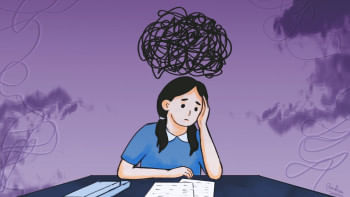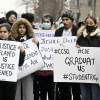The untold stories behind student deaths abroad

RK was my friend. He was a vivacious young man, always ready to take up new challenges. He was in his early 40s when he decided to pursue a PhD at a university in New York in 2021. He was overjoyed when he applied for and received a scholarship.
A single man, with just a younger brother and his family in Dhaka, he collected his life's savings for the degree and flew to the US around the end of that year.
Unfortunately, by the end of his first year at the university, he did not get stellar grades. He lost the scholarship. His funds were drying up as well. He tried to get a job at the university, but there weren't any. So, he started doing odd jobs. The hourly rates were low, and he was working extra hours.
He gradually became reclusive. RK, who was the life of any party, able to strike up a conversation and make anyone laugh, the one who was Mr Bangladesh a couple of times in the late 1990s, stopped answering our calls. He deactivated most of his social media platforms and kept only those where he did not need to interact with anyone.
In 2023, I received a call from another friend in Dhaka that RK's dead body had been found in his rented apartment. He had suffered a fatal brain stroke. As the management at his workplace could not reach him by phone, they contacted his landlord. The landlord knocked on the door and, as no one answered, he called the police, and they found his body. He had passed away a few days prior.
We later learnt that my friend had suffered a cardiac event a few months earlier. He had fallen into depression around this time. His colleagues at work shared that he had been dealing with these health issues for quite some time.
I miss my friend every time I read a news story about the deaths of Bangladeshi students in other countries.
This week, Mohammad Afriji Bin Apon (26), a Bangladeshi student, was found dead in an apartment in Japan. He had gone there to study automotive engineering.
Like my friend, Apon allegedly could not pay his tuition fees, and he lost access to basic utilities like electricity, water, and his phone connection. Living alone in a small rented apartment, he gradually fell into severe depression and malnutrition.
According to a report by Kaler Kantho, neighbours reported not seeing him for 15 days. Although some left food by his door, he was too weak to open the door and take the food. Before help could arrive, he succumbed to hunger and loneliness. His body was found by police later.
Tragic reports like these point towards a silent epidemic of mental illnesses being faced by many Bangladeshi students abroad.
According to UNESCO, in 2023, a total of 52,799 Bangladeshi students pursued higher education abroad. The US was the most popular destination with 8,524 students, followed by the UK with 6,586. Other destinations include Canada, Malaysia, Germany, and Australia.
The biggest concern that these Bangladeshis in foreign countries face is a lack of funds, followed by supplemental income to support themselves while they are there, academic challenges, immigration issues, health concerns, and so on.
Some students get scholarships. However, if they cannot consistently achieve the required grades, they often lose them. This creates anxiety and tension for them.
Finding a job is extremely difficult at a time when most developed countries are clamping down with regulations barring or discouraging foreign students or workers from getting jobs. As a result, most Bangladeshis fall into depression. They begin to shun social interactions, and the mental illnesses often lead to other debilitating disorders, which in some cases become fatal.
The crisis demands a multi-pronged and immediate response.
Bangladeshi missions in different countries could set up dedicated helplines for mental health victims. Fellow Bangladeshis can call these lines and seek support for themselves or for someone they care about who is facing such illnesses.
There are Bangladeshi student associations in some states of the US, Canada, and in some other countries. A strong network could be formed among these associations to prevent such tragedies from occurring in the future.
Mental health experts in Bangladesh should look into these trends. Some studies with relevant data could help the concerned authorities understand the severity of the situation and come up with actionable plans.
As a nation, we must ensure that the hopes and dreams of a better future after higher education do not become a nightmare for our students and their loved ones. We need to build that proverbial bridge of compassion and support that can span continents, so no Bangladeshi ever finds themselves alone and helpless.
Syed Tashfin Chowdhury is a communications professional and former journalist. He can be reached at [email protected].
Views expressed in this article are the author's own.
Follow The Daily Star Opinion on Facebook for the latest opinions, commentaries and analyses by experts and professionals. To contribute your article or letter to The Daily Star Opinion, see our guidelines for submission.


 For all latest news, follow The Daily Star's Google News channel.
For all latest news, follow The Daily Star's Google News channel. 







Comments